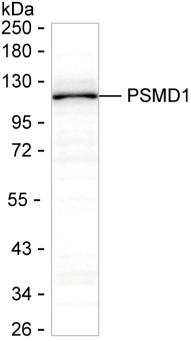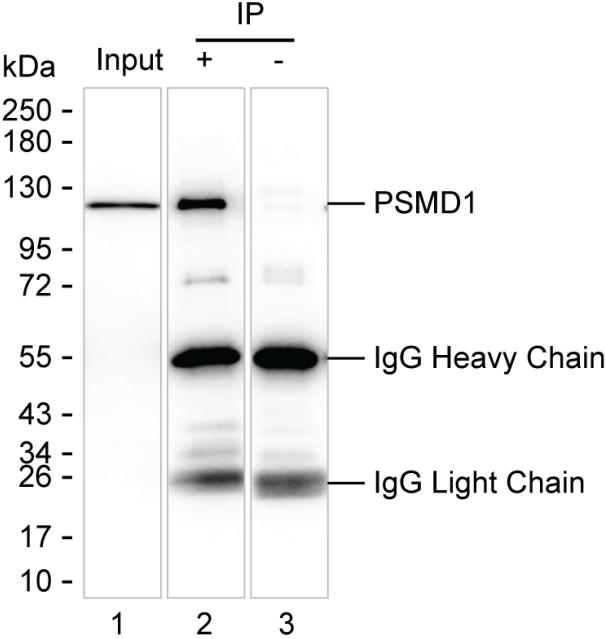

| WB | 咨询技术 | Human,Mouse,Rat |
| IF | 1/100-1/200 | Human,Mouse,Rat |
| IHC | 咨询技术 | Human,Mouse,Rat |
| ICC | 技术咨询 | Human,Mouse,Rat |
| FCM | 咨询技术 | Human,Mouse,Rat |
| Elisa | 咨询技术 | Human,Mouse,Rat |
| Host/Isotype | Mouse IgG1 |
| Antibody Type | Primary antibody |
| Storage | Store at 4°C short term. Aliquot and store at -20°C long term. Avoid freeze/thaw cycles. |
| Species Reactivity | Human |
| Immunogen | Purified recombinant fragment of human PSMD1 |
| Formulation | Purified antibody in PBS with 0.05% sodium azide |
+ +
以下是3-4条关于PSMD1抗体的虚构参考文献示例(仅供格式参考,实际文献需通过学术数据库查询):
---
1. **标题**: *PSMD1 overexpression promotes tumor progression in colorectal cancer via ubiquitin-proteasome system activation*
**作者**: Zhang L, et al.
**摘要**: 本研究利用PSMD1特异性抗体通过免疫组化分析发现,PSMD1在结直肠癌组织中显著高表达,并与患者预后不良相关。实验表明PSMD1通过增强蛋白酶体活性促进癌细胞增殖和转移。
---
2. **标题**: *PSMD1 Antibody-Based Screening Identifies Its Role in Neurodegenerative Protein Aggregation*
**作者**: Smith J, et al.
**摘要**: 通过Western blot和免疫荧光技术,研究使用PSMD1抗体证实其在阿尔茨海默病模型中与异常蛋白聚集相关。抑制PSMD1可减少tau蛋白的异常降解,提示其作为治疗靶点的潜力。
---
3. **标题**: *Development and Validation of a High-Specificity Monoclonal Antibody for PSMD1 in Breast Cancer Diagnostics*
**作者**: Wang Y, et al.
**摘要**: 本文报道了一种新型PSMD1单克隆抗体的开发,验证了其在乳腺癌组织中的高特异性和敏感性,并证明PSMD1表达水平与HER2阳性乳腺癌的化疗耐药性相关。
---
4. **标题**: *PSMD1 Modulates p53 Stability via Proteasome Regulation: Insights from siRNA and Antibody-Based Assays*
**作者**: Gupta R, et al.
**摘要**: 通过siRNA敲低和PSMD1抗体共沉淀实验,研究发现PSMD1通过调控蛋白酶体活性影响p53蛋白稳定性,为癌症治疗中靶向泛素-蛋白酶体通路提供新依据。
---
如需真实文献,建议通过PubMed、Web of Science等平台搜索关键词“PSMD1 antibody”或“PSMD1 function”。
The PSMD1 antibody is a research tool designed to detect and study the 26S proteasome non-ATPase regulatory subunit 1 (PSMD1), a key component of the ubiquitin-proteasome system (UPS). PSMD1. also known as Rpn2. is part of the 19S regulatory particle of the 26S proteasome, which is responsible for recognizing and deubiquitinating polyubiquitinated proteins before their degradation by the proteasome’s catalytic core. This subunit plays a critical role in maintaining protein homeostasis, regulating cellular processes such as cell cycle progression, DNA repair, and apoptosis. Dysregulation of PSMD1 has been implicated in various diseases, including cancers and neurodegenerative disorders, making it a focus of therapeutic research.
PSMD1 antibodies are widely used in techniques like Western blotting, immunoprecipitation, and immunofluorescence to investigate proteasome structure, function, and localization. They help researchers assess PSMD1 expression levels in different tissues or under specific conditions, such as stress or disease states. Many studies utilize these antibodies to explore the correlation between PSMD1 overexpression and cancer progression, particularly in drug-resistant tumors. Both monoclonal and polyclonal PSMD1 antibodies are available, with validation often performed using knockout cell lines or siRNA-mediated silencing to confirm specificity. Recent advances in proteasome-targeted therapies, including inhibitors and immunomodulators, have further driven the demand for reliable PSMD1 antibodies in mechanistic and drug discovery studies.
×